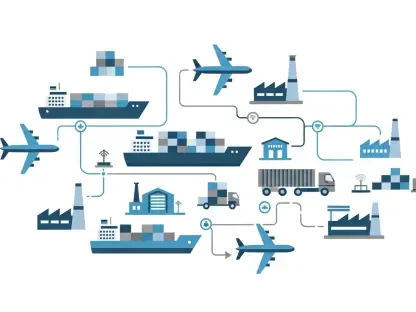Rohit Laila has decades of experience in the logistics industry, covering a span from supply chain management to delivery. His passion for technology and innovation has positioned him as a thought leader in the airfreight logistics sector. With geopolitical changes and market dynamics constantly reshaping the industry, it’s a privilege to have Rohit touch on critical aspects related to General Sales & Service Agents (GSSAs).
How do geopolitical tensions influence the role of GSSAs in the airfreight sector?
Geopolitical tensions significantly affect the airfreight sector, primarily by disrupting traditional trade routes and creating uncertainties. GSSAs play a crucial role in mitigating these disruptions. They offer alternative route planning and insightful market intelligence, ensuring that airlines and forwarders can adapt swiftly. During times of political instability, localized expertise becomes invaluable for maintaining operational continuity and securing cargo sales.
Could you elaborate on how the role of GSSAs has expanded beyond traditional cargo sales?
Traditionally, GSSAs focused on cargo sales and capacity booking for airlines. However, their role has considerably broadened. Now, GSSAs are important strategic partners offering services like market intelligence and digital logistics solutions. They help airlines navigate shifting trade patterns and economic changes, optimize capacities, and even assist in crafting pricing strategies based on volatile market demands and fluctuating fuel prices.
What specific market intelligence and alternative route planning services do GSSAs offer to airlines and forwarders?
GSSAs provide market insights related to demand trends, competitive analysis, and route profitability, which are critical for airline decision-making. They offer alternative route planning to avoid geopolitical hotspots or congested airspaces, ensuring a seamless supply chain. This can include identifying new markets and streamlining operations to minimize disruptions.
How important is localized expertise for GSSAs in the current airfreight market?
Localized expertise is invaluable in the current airfreight market. GSSAs with deep regional knowledge can effectively navigate local regulations and cultural nuances, which is essential for smooth operations. This expertise enables them to quickly adapt to market changes and ensure compliance with local laws, providing a competitive edge.
Can you provide an example of a scenario where GSSAs played a vital role in ensuring continuity amid border closures or evolving bilateral relations?
During the COVID-19 pandemic, many borders were closed, and bilateral relations evolved rapidly. GSSAs were pivotal in these situations, offering flexible solutions and alternative routes to maintain cargo flow. For instance, they facilitated cargo-only flights when passenger flights were grounded, ensuring essential goods, including medical supplies, continued to move efficiently.
Why do you think the demand for agile, tech-savvy, and regionally connected GSSAs will remain strong in the future?
The demand for agile, tech-savvy, and regionally connected GSSAs will persist due to the increasing complexity and volatility in global trade. As digital transformation accelerates, GSSAs must leverage technology to offer real-time data, advanced analytics, and customized solutions. Their regional connections and localized expertise make them indispensable for navigating market fluctuations and regulatory changes.
How do GSSAs help airlines optimize capacity and shape pricing strategies in response to volatile demand cycles and fluctuating fuel prices?
GSSAs assist airlines in optimizing capacity by tailoring strategies specific to fleet configurations and market conditions. They use historical data and predictive analytics to forecast demand, thus helping in adjusting capacities and routes. Their insights into market trends and fuel price fluctuations are vital for developing adaptive pricing strategies that maximize revenue and minimize costs.
What are some of the smart, scalable solutions GSSAs are implementing to handle the increased competition in the transatlantic and transpacific markets?
GSSAs are investing in advanced digital platforms to streamline booking processes, enhance cargo tracking, and improve customer service. They employ scalable solutions like dynamic pricing models and real-time capacity management to stay competitive. These smart solutions enhance operational efficiency and provide airlines with the flexibility needed to meet market demands in highly competitive transatlantic and transpacific corridors.
How have GSSAs diversified their services to meet the specialized freight demand for perishables, pharmaceuticals, and high-value cargo?
To meet the demand for specialized freight, GSSAs have significantly diversified their service portfolios. They have invested in temperature-controlled storage solutions and real-time monitoring systems to protect sensitive cargo like perishables and pharmaceuticals. Collaborating with certified handling agents and ensuring compliance with global standards like GDP and CEIV Pharma are also part of their strategies to build trust and reliability in these high-stakes markets.
Can you describe the cool chain solutions that GSSAs are investing in for temperature-controlled cargo?
GSSAs are enhancing their cool chain solutions by establishing temperature-controlled storage at major logistical hubs and integrating real-time temperature monitoring sensors. These investments ensure the integrity of temperature-sensitive cargo, from pharmaceuticals to perishables, by providing consistent control and visibility throughout the transport journey, reducing the risk of spoilage and compliance issues.
How do real-time temperature monitoring sensors help in ensuring the integrity of sensitive cargo?
Real-time temperature monitoring sensors provide continuous oversight of the cargo’s environmental conditions, alerting handlers of any deviations outside the specified range. This real-time visibility ensures prompt corrective actions can be taken to maintain cargo integrity, ensuring that pharmaceuticals remain effective and perishable goods stay fresh.
What expedited handling and fast-track customs clearance services do GSSAs provide to prioritize perishables?
GSSAs prioritize perishables through expedited handling processes and fast-track customs clearance. They coordinate synchronized unloading and immediate delivery to minimize dwell time, ensuring that time-sensitive goods reach their destination quickly. These services are crucial for maintaining the quality and compliance of perishable items.
How do GSSAs ensure compliance with global standards like GDP and CEIV Pharma for managing sensitive cargo?
GSSAs ensure compliance with standards such as GDP and CEIV Pharma by implementing stringent handling protocols, conducting regular training for staff, and collaborating with certified partners. They also use advanced monitoring and reporting systems to maintain transparency and adherence to regulatory requirements throughout the cargo journey.
How do GSSAs act as an extension of airlines to identify and fill gaps in resources, infrastructure, or local knowledge?
GSSAs function as an extension of airlines by conducting comprehensive assessments to identify any gaps in resources, infrastructure, or local knowledge. They then deploy tailored solutions, such as specialized teams or advanced technology, to bridge these gaps. Their regional expertise ensures that the airlines’ operations align with local market demands and regulations.
How have digital capabilities improved planning and real-time responsiveness for GSSAs?
Digital capabilities have revolutionized planning and responsiveness for GSSAs by enabling real-time tracking, dynamic capacity management, and predictive analytics. These technologies allow GSSAs to optimize routes, adjust to market changes swiftly, and improve overall operational efficiency. The integration of AI and automation further enhances their capability to manage demand volatility effectively.
What measures do GSSAs take to guarantee high-quality, temperature-controlled road transport for sensitive commodities?
GSSAs ensure high-quality, temperature-controlled road transport through partnerships with specialized logistics providers, constant monitoring of temperature conditions, and thorough verification processes. Dedicated team members oversee the loading and unloading processes, ensuring that all criteria for maintaining the integrity of sensitive commodities are met.
How have long-term contract negotiations become more complex for GSSAs due to fluctuating air cargo capacity and market volatility?
Fluctuating air cargo capacity and market volatility have made long-term contract negotiations more complex by introducing unpredictability into supply and demand dynamics. GSSAs counter this by adopting flexible commercial models, segmenting their approach to reflect each airline’s unique needs, and utilizing data-driven insights to craft adaptive solutions that accommodate these market uncertainties.
What strategies do GSSAs use to balance yield expectations, route profitability, and seasonality in commercial models?
GSSAs balance yield expectations, route profitability, and seasonality by leveraging historical data and predictive analytics to forecast demand and adjust their strategies accordingly. They create customized commercial models for each airline, considering variables like market demand trends and seasonal fluctuations to optimize profitability while meeting yield goals.
How do GSSAs handle the challenge of convincing airlines to commit to markets where capacity may not align with demand?
Convincing airlines to commit to markets with misaligned capacity and demand requires GSSAs to offer compelling value propositions. They present data-driven market analysis, demonstrate agile route planning, and provide flexible capacity management solutions to showcase the potential for profitable operations despite the initial misalignment.
How do global economic instability, fuel price surges, and geopolitical factors impact air cargo rates and long-term contract pricing for GSSAs?
Global economic instability, fuel price surges, and geopolitical factors create significant unpredictability in air cargo rates and long-term contract pricing. These elements force GSSAs to adopt flexible and dynamic pricing models, use hedging strategies to manage fuel costs, and deepen their market intelligence capabilities to stay agile amidst these volatile conditions.
How are GSSAs addressing the unpredictability challenge in the airfreight market?
GSSAs address market unpredictability by investing in technology for real-time data analytics and predictive modeling, fostering strong relationships with diverse stakeholder networks, and maintaining an adaptive approach to strategy and operations. These measures enable them to remain versatile and responsive to sudden market changes.
Do you have any advice for our readers?
For those involved in or looking to enter the logistics and airfreight sector, my advice is to stay informed about global developments and continuously invest in technology. The ability to adapt quickly to market shifts and leverage digital tools for efficiency will be invaluable. Build strong regional networks and always prioritize learning and innovation.









